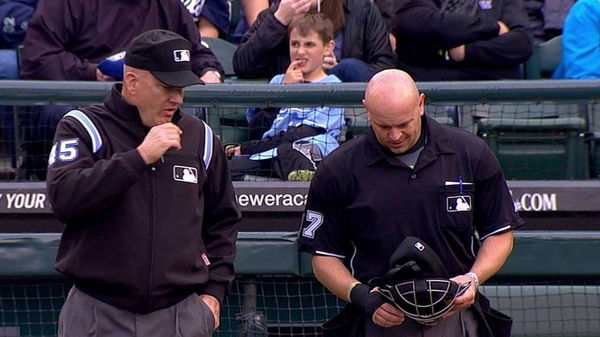

In the structured world of professional sports, personal expression often takes a backseat to tradition and uniformity. Leagues spend great energy and care to craft their image, especially for officials who personify the authority of the game. However, sometimes a very human story emerges, one so compelling it can gently reshape long-standing rules. This isn’t about a loud protest but the quiet power of love and remembrance. It shows how a personal tribute, born from loss, can unexpectedly ignite great institutional change, reminding us that policies can indeed evolve.
Watch What’s Trending Now!
Veteran MLB umpire Scott Barry faced such a situation. He chose to get a tattoo as a tribute to his beloved late wife, Christine. Christine died of colon cancer in July 2023 after courageously battling it for nine years. Barry was more than ready to comply with current MLB rules requiring tattoos to be covered. “If they had asked me to cover it, I didn’t have any issues with that,” Barry shared. “I had already planned for that. And if they’re gonna fine me, I’m OK with that, too. It’s that important.” He had even bought sleeves for that purpose.
Previously, Major League Baseball’s stance was clear and firm. The collective bargaining agreement with the MLB Umpires Association stated, “tattoos and other forms of body art must be covered by their uniform so they are not visible.” However, a notable shift occurred. As a result of a rule change in the 2025 MLB collective bargaining agreement, umpires are now permitted to display their arm tattoos above the elbow. This is the first time in league history that kind of visible expression is allowed for its on-field officials.
This significant policy adjustment wasn’t entirely unconditional. Any such visible tattoo, under the new rule, is “subject to Commissioner’s Office approval which shall not be reasonably withheld.” Prior to the formal change, Barry had also been open with his plans. He told his fellow umpires and, importantly, Dan Bellino, who was then the MLBUA vice president and is now its president. Touched by Barry’s story, Bellino acted on his own to bring up the potential rule change during union conversations with the league.
Currently, Scott Barry is the only active MLB umpire with visible tattoos affected by this change.
Beyond the uniform: A personal story of an umpire and a compassionate change
The tattoo itself is a deep and well-executed homage. Located on his upper right arm as a half-sleeve, it features a pocket watch displaying the exact date and time when Christine died. The concept of time became incredibly precious to the couple during her illness. Barry recalled, “We always looked forward… I would just say: ‘Okay, I get it, but we have five minutes.’ And at the end of those five minutes, I need you to focus on getting better.”
The artwork also features a blue rose, the color of awareness of colorectal cancer (and Christine’s favorite color). “It’s something that I’m super proud of,” Barry said. “I love what it stands for, and I always have that with me.”
And Barry’s career officiating the diamonds? Scott Barry has built a long and respected career. He debuted in the major leagues on June 4, 2006, and became a full-time major league umpire in 2011, and wore number 87. His experience has earned him numerous high-profile assignments. These include the World Baseball Classic in 2006, numerous Division Series (2012, 2014, 2022), and the 2014 All-Star Game. And a League Championship Series in 2018. His established profile certainly lent weight to his personal situation and contributed to that pivotal change in the landmark policy.
The story of Scott Barry serves as a powerful reminder that behind uniforms and rulebooks are individuals with deeply personal lives. His commitment to honor his wife, approached with respect for existing processes, opened a conversation and made a difference. It is an example of a compassionate evolution in a traditionally conservative league. How many other unspoken stories might one day reshape the games we love?

